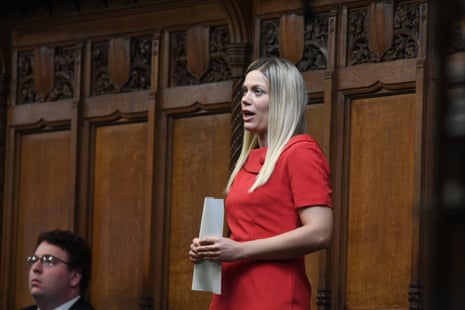No 10 defends Zahawi after reports he paid millions to settle tax dispute – UK politics live | Politics
No 10 defends Zahawi after reports he paid millions to settle tax dispute
At the post-PMQs lobby briefing the PM’s press secretary said that Rishi Sunak has full confidence in the Conservative party chair, Nadhim Zahawi, and takes him “at his word” over allegations around his tax affairs.
At PMQs, asked about the report that Zahawi has paid millions to settle a tax dispute, Sunak said Zahawi has “addressed this matter in full”. In fact, Zahawi has not confirmed the payments, or answered questions about the story, but just issued a statement saying he pays his taxes.
The PM’s press secretary defended this, saying Zahawi “has spoken and been transparent with HMRC”.
Asked if Sunak considered the matter closed, she said:
I don’t know whether the prime minister has reviewed it in full, but I do know that he takes Nadhim Zahawi at his word.
She also said that Sunak intended to publish his own tax return shortly.
Key events
Filters BETA
Former Tory leader William Hague says Brexit probably factor in collapse of Britishvolt
William Hague, the former Tory leader and foreign secretary when David Cameron was PM, has said that Brexit was probably a factor in the collapse of the Britishvolt battery startup company. In an interview with the News Agents podcast, Hague said it was “very concerning” that the company had gone into administration. He went on:
And it’s a sad reflection, probably, on Brexit because of course, what do you need in some of these technologies, you need scale, you need to know there’s a big market. If you are going to succeed with batteries, you need big manufacturers to be in the same market using those batteries.
So, that’s part of the damage that has been done by leaving the EU.
However, that’s not going to change. So, now we have to say, well, going for net zero technologies and levelling up in those regions and getting more investment into the British economy are mutually reinforcing objectives. But they need consistency and clarity from government.
Hague was seen as very Eurosceptic when he was elected Tory leader in 1997 – it was probably the key factor that led to him beating Ken Clarke – but by 2016 he was relatively pro-EU, compared to others in his party, and he voted remain.
At PMQs the Conservative MP Laura Farris asked Rishi Sunak if he thought that Tony Blair “had point when he said last year that the ‘big defect’ at the birth of the Labour party was its ties to organised labour”.
I’m grateful to dfic1999 in the comments below the line for flagging up the passage where Blair said that. John Rentoul quoted it in this article about a Q&A that Blair did with students at Kings College London. Rentoul wrote:
One asked how he would win an election for Labour today. “The first thing is to realise that the psychology of the country towards Labour and the Conservatives is different,” [Blair] said. “Unfortunately, if you look back on, what, 120 years of Labour’s existence, we’ve been in power for less than a third, roughly a quarter, of that time. And half of it was New Labour, and there are parts of the Labour party that are not too keen on remembering that part.
“So you can’t say Labour’s been a successful political project, really. Because if you take the 100 years before that, the Liberal party – which was then the alternative to the Conservatives – I think they were roughly equal in the time they spent in government.
“Personally, I think the big defect at the birth of Labour was to be tied to organised labour rather than to be broadly progressive. The separation of that liberal tradition of progressive politics and the Labour tradition is the thing I tried to cure in New Labour, but after I left people went back to the traditional roots of Labour, which I think was – and is – a mistake.
“The difference that makes to the psychology of the country towards the two parties is that the country looks at the Tories and thinks: ‘They only care about power.’ Now, if you’re Labour, you think: ‘That’s really bad; really unprincipled.’ But the public finds it curiously comforting. Because they think: ‘They only care about power, so they’re probably going to try to please me most of the time.’ So what we think is a point of criticism is really a point of reassurance.
“Now, when you come to Labour, Labour always thinks Labour’s problem is whether it’s principled enough. But the country knows we’re principled – oh yes, we’ve got those principles. And what they think is: ‘Yes, if it comes to the principles and me, they might just choose the principles.’ So what we find comforting they find puts them on guard.”
Extinction Rebellion activists pour black paint outside Gove’s office
Extinction Rebellion activists have chained themselves together at the entrance of the Department for Levelling Up, Housing and Communities in London to protest against a new coalmine in Cumbria approved by its secretary, Michael Gove. My colleague Damien Gayle has the story here.

Former supreme court judge says legal challenge against blocking of Scottish gender recognition bill likely to fail
Lord Hope, a former deputy president of the supreme court, has said that he thinks the chances of the Scottish government getting the supreme court to overturn the UK government’s decision to block its gender recognition reform (GRR) bill are “very low”.
He told the BBC that he found the “statement of reasons” published yesterday explaining why the GRR bill undermined UK-wide equality law (which is reserved to Westminster) convincing and “devastating”, and he said the Scottish government would be wasting its time challenging it through judicial review. He said:
It seems to me you’re risking a lot of time, as it will take a long time to get to the supreme court, and also whether it’s a sensible use of public money.
It is open to question whether it is a wise decision from the prospects of success, which I would think were very low given the detail in the document that has been published.
But not all lawyers agree. In a long thread on Twitter yesterday, Charlie Falconer, the former Labour lord chancellor, said that most of the problems for UK law supposedly created by the Scottish bill, according to the statement of reasons, are minor or speculative, and that they do not justify overturning the legislation.
The thread starts here.
The s35 Statement of Reasons has now been published. It identifies 3 sets of reasons why the Sec of State considers the GRR Bill would have an adverse effect on the operation of reserved matter law namely equal opportunities.
— Charlie Falconer (@LordCFalconer) January 17, 2023
And here is his conclusion.
The Statement of Reasons di not justify the use of s35
— Charlie Falconer (@LordCFalconer) January 17, 2023
Senior Tories have privately voiced fears about a slew of concessions made by Rishi Sunak to rebels on planning, the environment and online safety, suggesting counter-rebellions may have to be organised, my colleague Jessica Elgot reports. She says:
Several former ministers have suggested they are worried about Sunak’s strategy and said the prime minister could find himself trapped between two wings of his party. Potential flash points include the retained EU law bill, the economic crime bill and the finance bill after the spring budget.
One warned that Sunak would risk seeing counter-rebellions emerging that could reignite old party tensions if the same concessions were seen on other issues such as Brexit, taxation or planning.
“We cannot have a situation where the prime minister is so frightened of his own party that 30 colleagues can get him to change his mind about anything,” one former cabinet minister said.
The full story is here.
No 10 defends Zahawi after reports he paid millions to settle tax dispute
At the post-PMQs lobby briefing the PM’s press secretary said that Rishi Sunak has full confidence in the Conservative party chair, Nadhim Zahawi, and takes him “at his word” over allegations around his tax affairs.
At PMQs, asked about the report that Zahawi has paid millions to settle a tax dispute, Sunak said Zahawi has “addressed this matter in full”. In fact, Zahawi has not confirmed the payments, or answered questions about the story, but just issued a statement saying he pays his taxes.
The PM’s press secretary defended this, saying Zahawi “has spoken and been transparent with HMRC”.
Asked if Sunak considered the matter closed, she said:
I don’t know whether the prime minister has reviewed it in full, but I do know that he takes Nadhim Zahawi at his word.
She also said that Sunak intended to publish his own tax return shortly.
Collapse of Britishvolt ‘hammer blow’ for government’s levelling up strategy, MPs told

Alex Lawson
The collapse of electric vehicle battery startup Britishvolt into administration has been declared a “hammer blow” for levelling up during a debate in the Commons.
The company, which was planning to build a giant “gigafactory” near Blyth in Northumberland went into administration on Tuesday after talks with potential investors failed. The majority of its 300 employees were immediately made redundant.
DUP MP Sammy Wilson described the failure as a “tragedy” and a “hammer blow to the government’s levelling up policy”.
Jonathan Reynolds, the shadow business secretary, said that the government should take some of the blame. He said:
When the Britishvolt site was first announced in 2019 with the promise to build the UK’s second ever gigafactory and create 8,000 jobs in Northumberland, it was lauded by the government as their flagship example of levelling up.
Government ministers fell over themselves to take the credit and so now they must also accept some accountability for its failure, because, much like their levelling up strategy, all we have been left with is an empty space instead of what was promised.
The collapse of Britishvolt into administration is in no uncertain terms a disaster for the UK car industry, but what is even more worrying is that it’s a symptom of a much wider failure.
Energy minister Graham Stuart said the government’s decision not to hand promised investment to Britishvolt was because conditions “including private sector investments” were not met. He added:
Throughout the process, we’ve always remained hopeful that Britishvolt would find suitable investors and we’re disappointed that this hasn’t been possible.
We want to ensure the best outcome for the site, and we will work closely with the local authority and potential investors in order to achieve this.
Labour’s Lloyd Russell-Moyle apologises for calling speech by Tory MP ‘transphobic dog-whistle’
The Labour MP Lloyd Russell-Moyle today apologised for describing a contribution from a Conservative backbencher as “one of the worst transphobic, dog-whistle speeches that I have heard in an awful long time”.
Russell-Moyle made the comment yesterday, as he was responding to a speech by Miriam Cates in which she said the Scottish gender recognition reform (GRR) bill could be exploited by “predators”.
Raising a point of order today, Russell-Moyle said he had written to Cates to apologise. He went on:
I stand by the words that I said and I profoundly disagree with the comments the honourable member made.
But our job as MPs is to channel passion and anger into considered debate to win our arguments. In this case, the trans community and devolution.
I recognise that I failed to control that passion during what was an emotional debate.
I should have expressed my deep disagreement on what I believe is an abhorrent view in a more appropriate way.
I want to particularly apologise to Madam deputy speaker [Dame Rosie Winterton] who had to preside over the debate.
In her speech Cates said predators would exploit the GRR bill. She said:
We should not be asking how easy it is for someone who is uncomfortable with their sex to obtain a GRC [gender recognition certificate]; we should be asking how easy it is for a predator to get access to children. The bill would make it vastly easier.
In response, Russell-Moyle said:
That speech was probably one of the worst transphobic dog-whistle speeches I have heard in an awfully long time. Linking the bill with predators is, frankly, disgusting, and you should be ashamed.

In the Commons MPs are debating the remaining stages of the retained EU law (revocation and reform) bill. Opening the debate Nusrat Ghani, a business minister, defended the decision in the bill to set 2023 as the preferred deadline for the removal of retained EU law from the UK statute book. (See 10.35am.) She said:
I cannot stress enough the importance of achieving this deadline, the deadline of 2023. Retained EU law was never intended to sit on the statute book indefinitely.
It is constitutionally undesirable as currently some domestic laws, including acts of parliament, remain subordinate to some retained EU law.
After Labour’s Stella Creasy criticised the way the bill allows ministers, not parliament, to decide if retained EU laws should be abandoned, or how they should be replaced, Ghani said the parliamentary officials were “comfortable” with a process set out in the bill. She added:
The crunch is, if you don’t like Brexit, if you didn’t like the way the Brexit vote took place, you are not going to like any elements of this bill.
Teaching unions report ‘no progress’ after further talks with education secretary

Sally Weale
Talks between the teaching unions and the education secretary, Gillian Keegan, broke up after just over an hour this morning, with unions reporting zero progress.
Mary Bousted, the joint general secretary of the National Education Union (NEU) whose members have voted for strike action, said the meeting was “constructive” and the secretary of state had been keen to talk about issues affecting teachers such as workload and recruitment and retention.
There was however no discussion about an improved pay deal, either this year or next. “I’m happy to talk about all these other issues,” said Bousted, “but we’re not talking about things that will resolve the pay dispute.” The NEU is due to begin seven days of strike action on 1 February.
Geoff Barton, the general secretary of the Association of School and College Leaders, said:
While it is good that these talks are continuing, and we are fully supportive of an ongoing dialogue, we have to report that no progress was made at this meeting and we are no nearer a solution.
There remained three unresolved issues, Barton said. He explained:
The first is the inadequacy of the pay award in this academic year, which at 5% for most teachers and leaders is well below inflation, currently running at 13.4% on the retail prices index measure and 10.5% on the consumer prices index measure. The fact that the pay award was not fully funded by the government has piled more financial pressure on to school leaders and governors.
The second is next year’s pay award which the education secretary has already sought to constrain in her remit letter to the pay review body, where she says it is particularly important to have regard to the government’s inflation target – which at 2% would represent yet another substantial below-inflation pay award.
The third is the unsustainable workload of leaders and teachers. This is a direct consequence of the insufficiency of government funding to education over the past 12 years which has left staff having to do more work with fewer resources.
Nobody wants to see industrial action, but it is not surprising that members of the NEU have voted in favour of strike action in these circumstances. Teacher shortages are a critical issue for virtually every school and college in the country and are causing educational damage on a daily basis. The government must do better for teachers, leaders and pupils.






